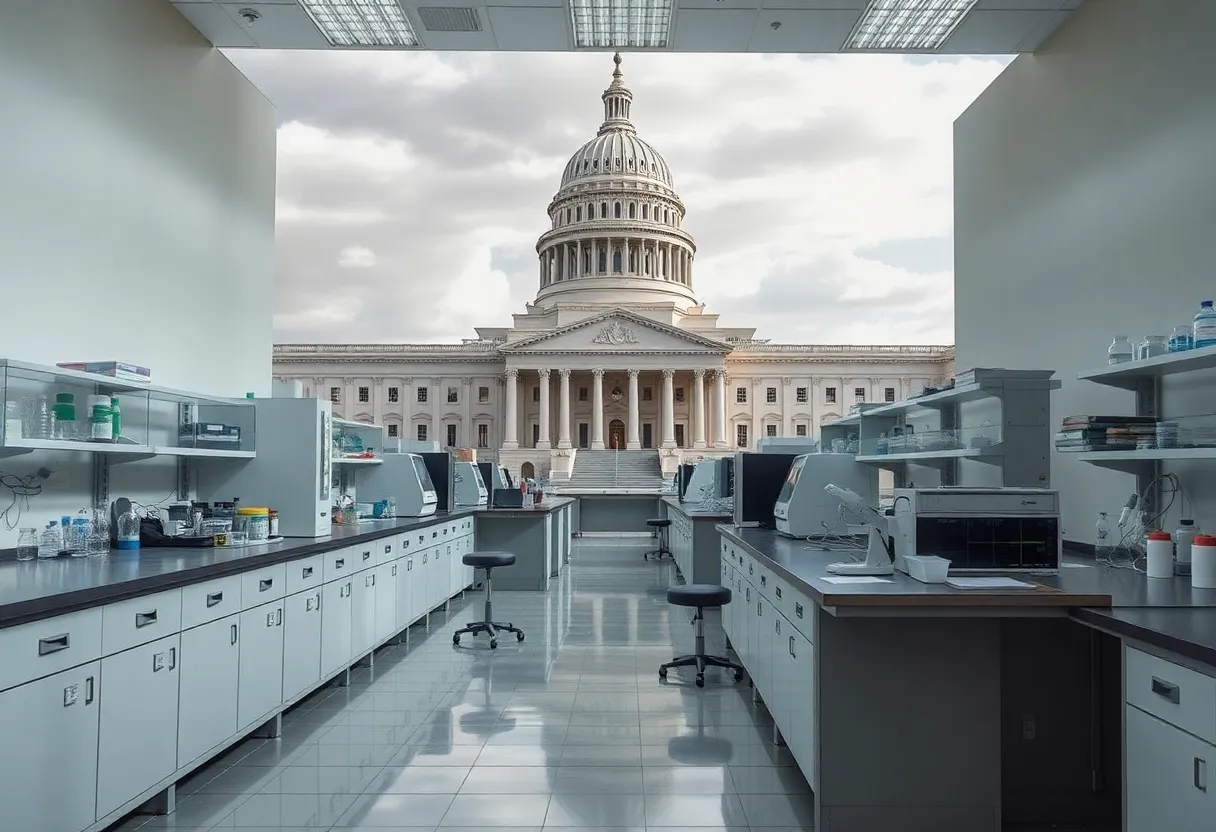News Summary
Massachusetts is confronted with a federal funding crisis as nearly 1,000 research grants worth $2.6 billion are canceled, jeopardizing its innovation sector and economic growth. The state ranks poorly in job creation and economic progress since 2020, heavily relying on the education and healthcare sectors. Urgent measures are called for to address the funding cuts that threaten vital research and scientific advancement in Massachusetts, especially within its life sciences sector.
Massachusetts Faces Federal Funding Crisis Endangering Research and Economic Growth
Massachusetts is currently grappling with a federal funding crisis that poses a serious threat to the state’s innovation sector, which plays a critical role in driving its economy. Approximately 1,000 research grants from the National Institutes of Health (NIH) and the National Science Foundation (NSF), valued at $2.6 billion, have been canceled by the Trump administration. This significant reduction in federal research funding is anticipated to continue, further jeopardizing the scientific, biomedical, and engineering research essential for the state’s economic vitality.
The economic implications of these funding cuts are profound. Since 2020, Massachusetts has experienced a lag in economic growth despite boasting the second-highest per capita Gross State Product in the country. Furthermore, the state holds the unfortunate distinction of ranking as the third worst in the nation for private sector job creation during this same time frame, further stalling progress in a region heavily reliant on innovative industries.
The education and health services sectors are the backbone of employment in Massachusetts, collectively providing jobs for around one million individuals. Mass General Brigham and Beth Israel Lahey Health are identified as the state’s largest non-government employers, followed by the University of Massachusetts, Harvard University, and the Massachusetts Institute of Technology (MIT).
Consequences for Research-Dependent Industries
The cancellation of federal research funding is particularly alarming for Massachusetts’ thriving life sciences sector, which supports approximately 143,000 jobs and is heavily reliant on ongoing research and innovation. The state’s strong research universities and academic medical centers have historically attracted top talent and facilitated landmark advancements in various scientific fields. However, the recent funding cuts threaten to undermine this foundation.
Urgent measures are necessary from state leaders across various sectors including government, academia, business, and philanthropy to preserve the state’s research infrastructure. Proposed actions include:
- Implementing a short-term bridge funding plan for universities to prevent lab closures and talent migration.
- Approving a funding plan that matches half of the federal funding cutbacks, contingent on matching contributions from universities.
- Streamlining the review process for funding by relying on previously vetted research projects.
- Formulating a future roadmap that accounts for a reduced federal role in research funding through the convening of a panel of leaders.
Challenges Facing Research Institutions
In a related development, leaders at Williams College have decided to pause the acceptance of federal research grants due to compliance concerns stemming from new diversity, equity, and inclusion (DEI) restrictions imposed by the Trump administration. Simultaneously, a federal judge in Boston has issued a temporary restraining order halting the NIH’s plan to cut overhead payments to universities, stemming from a lawsuit that argues these funding reductions could lead to layoffs, disrupt research projects, and ultimately cause laboratory closures.
Scientists have voiced concerns that limiting indirect costs will hinder the advancement of research and the development of life-saving therapies, essential for public health. The NIH’s changes signify a notable shift in how indirect costs are reimbursed, with caps set at 15% that could drastically impact funding meant for supporting critical services necessary for research operations.
The University of California has estimated that the new NIH regulations could lead to annual budget cuts amounting to hundreds of millions of dollars, creating further ripple effects across educational and clinical services in the region and beyond.
As Massachusetts navigates this crisis, it remains essential for all stakeholders to collaboratively address the various challenges posed by funding cuts to ensure continued growth and innovation within its vital research sectors.
Deeper Dive: News & Info About This Topic
- Reuters: US Judge Blocks Slashing Universities’ Federal Funding
- Google Search: Federal Funding crisis Massachusetts
- Boston Globe: Williams College Temporarily Declines New NIH/NSF Grant Funding
- Wikipedia: National Institutes of Health
- Oregon Capital Chronicle: Permanent Injunction Preventing NIH Cap on Research Payments
- Encyclopedia Britannica: Science
- Stat News: Judge Orders Nationwide Halt on Trump NIH Research Cuts
- NBC News: Trump Administration Sued Over Funding Cuts to Research Projects

Author: STAFF HERE BOSTON WRITER
The BOSTON STAFF WRITER represents the experienced team at HEREBoston.com, your go-to source for actionable local news and information in Boston, Suffolk County, and beyond. Specializing in "news you can use," we cover essential topics like product reviews for personal and business needs, local business directories, politics, real estate trends, neighborhood insights, and state news affecting the area—with deep expertise drawn from years of dedicated reporting and strong community input, including local press releases and business updates. We deliver top reporting on high-value events such as Boston Marathon, Head of the Charles Regatta, and Boston Harborfest. Our coverage extends to key organizations like the Greater Boston Chamber of Commerce and Associated Industries of Massachusetts, plus leading businesses in finance, biotech, and insurance that power the local economy such as Fidelity Investments, Biogen, and Liberty Mutual Insurance. As part of the broader HERE network, we provide comprehensive, credible insights into Massachusetts's dynamic landscape.





